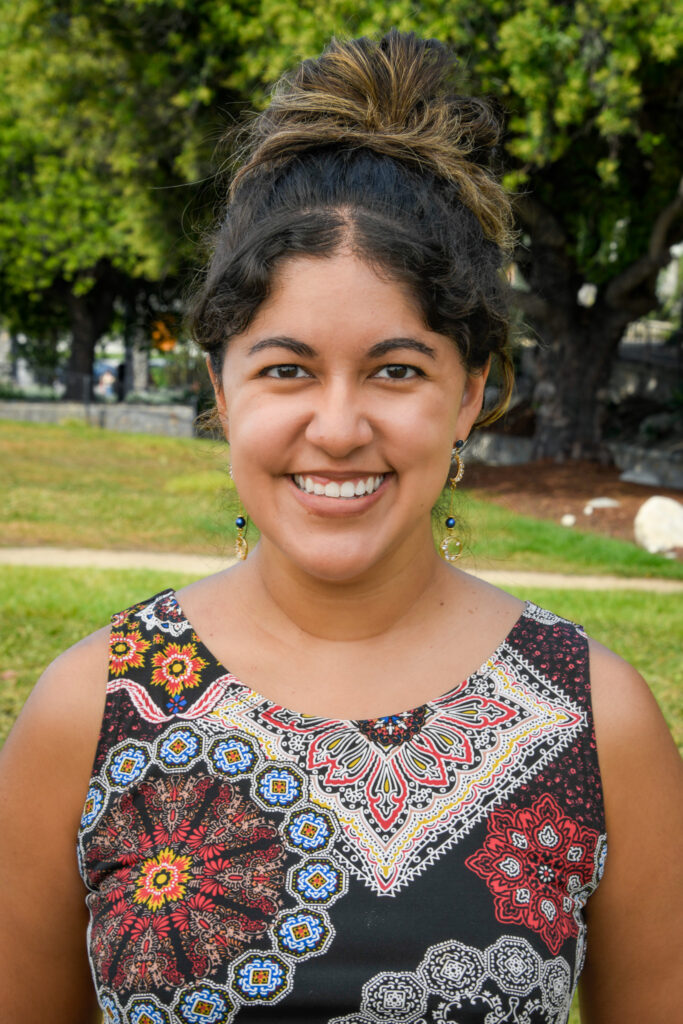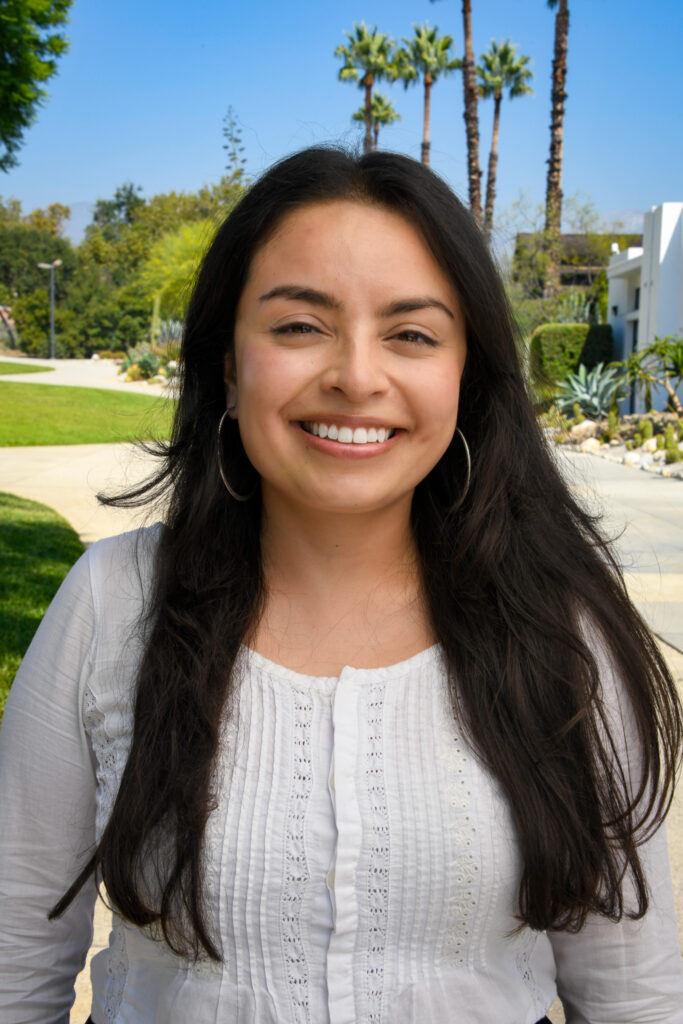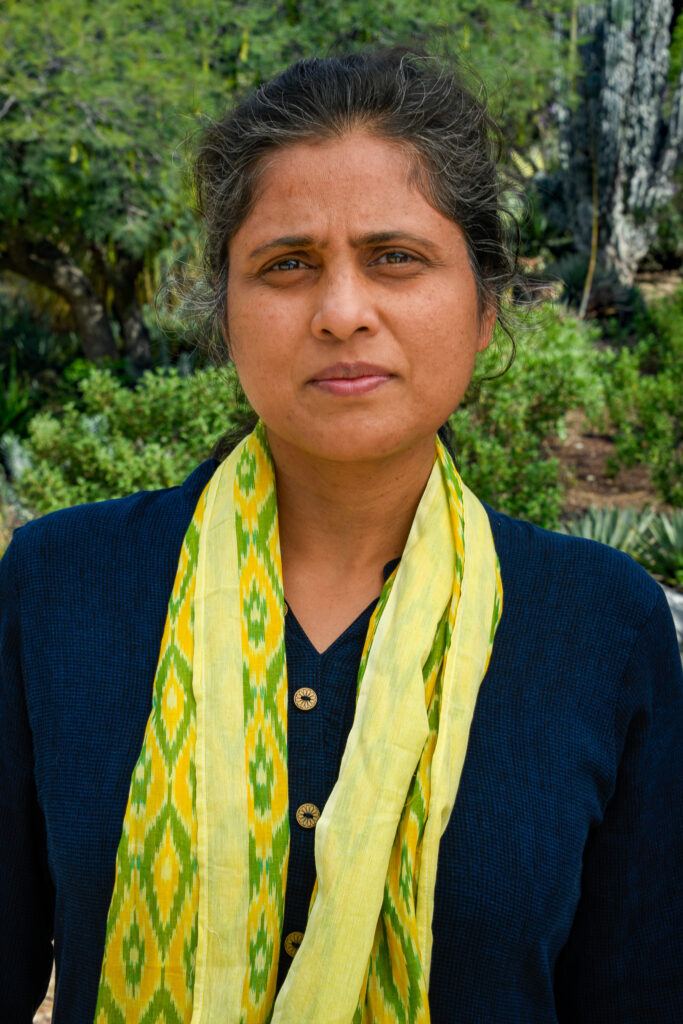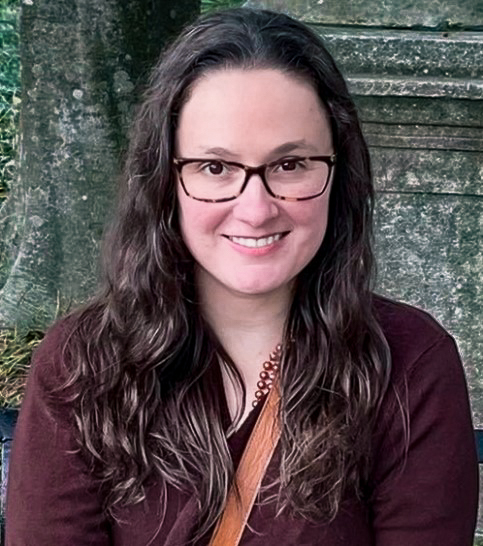Several current faculty also have been awarded tenure and other promotions
Five new tenure-track faculty have joined the Pitzer community of scholars with the start of the academic year. Their fields include anthropology, media studies, economics, English and world literature, and environmental analysis, and each brings expertise in research and scholarship that reflects their engagement with contemporary issues.
In addition, several current professors also received promotions this fall. New faculty positions are listed below followed by recent faculty promotions.
Introducing New Faculty
 Professor Andrea Acosta
Professor Andrea Acosta
Andrea Acosta
Assistant Professor of Digital Media
Education:
PhD in English from University of California, Los Angeles
BA in English from Stanford University
Andrea Acosta works in digital media and is a critical race scholar with training in literature and media studies. Her teaching combines digital media studies and theory with her background in literary analysis to ask questions about race, inequality, and power in the digital era.
Her dissertation explores minoritarian subcultures online, including media fandoms, creative communities, and amateur content producers, with specific attention to their ways of performing with and through the virtual body. Acosta’s essay “Bots and Binaries: On the Failure of Human Verification” appeared on Post45’s The Hallyu Project as a commentary on how K-pop fans leverage “bot-like” behavior in a large-scale digital movement.
 Professor Ángela Castillo-Ardila
Professor Ángela Castillo-Ardila
Ángela Castillo-Ardila
Assistant Professor of Anthropology
Education:
PhD in Anthropology from University of California, Berkeley
MSc in Geography from Universidad de los Andes
BA in Anthropology from Universidad Nacional de Colombia
Ángela Castillo-Ardila is an anthropologist who researches environmental conflicts and political action in Latin America. Her current project, Defending Territory, Water, and Life: Dismantling Large-Scale Mining Frontiers in Colombia, draws on ethnographic fieldwork, archival research, and community engagement initiatives to examine the formation of anti-large-scale mining coalitions in Colombia.
Her work looks at the emerging political subjectivities and types of collective action fostered under the umbrella of territorial and water defense in the context of extractive disputes. Since 2018, Castillo has been tracking the unprecedented case of how a coalition of territorial and water defenders from Tolima, Colombia, managed to halt the Colosa Project, a large-scale initiative for the industrialized extraction of gold.
Castillo’s research interests include nature, politics, extractive frontiers, multi-species relations, and Latin America. In 2019, she co-authored a book in Spanish, La minería de oro en la selva, which examines independent gold mining in the Colombian Pacific and Amazon.
 Professor Deepti Goel
Professor Deepti Goel
Deepti Goel
Assistant Professor of Economics
Education:
PhD in Economics from Boston University
MA in Economics from Delhi School of Economics
BA in Economics from University of Mumbai
Deepti Goel is an applied microeconomist who previously taught at Azim Premji University and the Delhi School of Economics. Goel is also a research fellow at IZA-Institute of Labor Economics and the Global Labor Organization. Her teaching interests are in statistics, econometrics, labor, and development.
One strand of Goel’s work is understanding how gender, caste, and immigrant status influence economic and non-economic outcomes, including self-worth. Another strand measures government-financed programs and how public expenditure can be made more effective.
Some of Goel’s recent papers were ideated in class, and she has also co-authored with students. Her work has appeared in Review of Development Economics, ILR Review, and The Indian Journal of Labour Economics.
 Professor Amanda Louise Johnson
Professor Amanda Louise Johnson
Amanda Louise Johnson
Assistant Professor of English and World Literature
Education:
PhD and MA in English Literature from Vanderbilt University
MA in 18th-Century Studies from University of York
BA in English Literature from University of Chicago
Before Pitzer, Johnson was a lecturer at Rice University, where she researched and taught American and Transatlantic literatures (1492–1917) as well as the American Gothic. Johnson’s book manuscript, Romancing the New World: Anglo-American Narratives of Self-Creation, is forthcoming. Arguing for an American romance tradition that originates in the 17th-century Caribbean-South, Romancing the New World draws upon Johnson’s research during fellowships at the University of Virginia and the Newberry Library.
Johnson’s second book project, which has received research support from the South-Central Modern Language Association and the New Orleans Center for the Gulf South, concerns white supremacy’s role in “canonizing” authors. Johnson’s scholarship has appeared in Modern Philology and Restoration, among other journals.
 Professor Shawnika E. Johnson
Professor Shawnika E. Johnson
Shawnika E. Johnson
Assistant Professor of Environmental Analysis
Education
PhD in Politics & Government and MS in Applied Gender Studies from Claremont Graduate University (CGU)
MS in Urban and Regional Planning from California Polytechnic State University (Cal Poly)
BASc in Health Science from California State University, Long Beach
Before Pitzer, Shawnika E. Johnson was a research assistant at CGU and a lecturer in urban and regional planning at Cal Poly. Her research addresses environmental injustice in communities of color and the political behavior of African American female legislators specializing in social and environmental injustice.
Johnson has worked for the Innovating Planning Consulting Firm, where she managed projects, contracts, and consultant services. Johnson has provided contractual services to real estate developers and land use attorneys. She has also been a planner for the City of Irwindale, City of Yorba Linda, and City of Fontana.
Faculty Promotions
Pitzer has awarded tenure to five faculty members in psychology, English and world literature, and history. Four other faculty members have also received promotions.
Findley Finseth has been promoted to associate professor of genomics with tenure. Her research program investigates the evolutionary drivers of biodiversity. Findley currently focuses on the California native wildflowers Mimulus. Her work spans studies of selfishly evolving genes to the genetic basis of thermally adapted plants in Yellowstone National Park. Findley has been published in Proceedings of the Royal Society-B, Molecular Biology and Evolution, and Molecular Ecology.
Steffanie Guillermo has been promoted to associate professor of psychology with tenure. Since joining Pitzer in 2017, Guillermo has shared her expertise in racial/ethnic stereotyping, threat perceptions, and bias against immigrants. Her research has recently appeared in Journal of Criminal Justice Education and Hispanic Journal of Behavioral Sciences. Guillermo is the faculty-in-residence for Pitzer sophomores, juniors, and seniors.
Amanda Lagji is now associate professor of English and world literature with tenure after teaching at Pitzer since 2017. Lagji recently published her book Postcolonial Fiction and Colonial Time: Waiting for Now (Edinburgh University Press). Her research interests include Global Anglophone literatures, postcolonial literature and theory, time and narrative, African literature, and more.
Marcus Rodriguez has been promoted to associate professor of psychology with tenure. After joining Pitzer in 2018, Rodriguez established the Global Mental Health Lab to give students research opportunities in clinical psychology and to make mental health care more accessible. His work has recently appeared in Journal of Behavior Therapy and Experimental Psychiatry and International Journal of Cognitive Therapy.
Urmi Engineer Willoughby has been promoted to associate professor of history with tenure. Willoughby’s research focuses on disease and ecology in North America. Her first book, Yellow Fever, Race, and Ecology in Nineteenth-Century New Orleans, won the Williams Prize for best book in Louisiana History. Her current project, Cultivating Malaria: The Historical Ecology of Fever in Early America, is an environmental and cultural history of malaria. She has taught at Pitzer since 2020.
Juanita C. Aristizábal has been promoted to full professor of modern languages, literatures, and cultures after teaching at Pitzer since 2014. Aristizábal studies Colombian literature and culture, and her research interests include environmental humanities and innovative approaches to second language acquisition and community-based and experiential learning. Her latest article on relational ontologies in contemporary female Colombian writers was published in the Revista de Estudios Colombianos.
Patrick Ferree has been promoted to full professor of biology. Ferree received the National Science Foundation’s (NSF) prestigious CAREER grant in 2015 and another NSF grant in 2021 to study how certain “selfish” genetic elements alter inheritance patterns at the molecular level. In 2020 Science Advances published a study Ferree co-authored about the “selfish” B chromosome in jewel wasps. He has taught at the W.M. Keck Science Department since 2010.
Todd Honma has been promoted to full professor of Asian American studies. With Pitzer since 2012, Honma has taught courses such as Race, Empire, Filipinx America; Tattoos in American Popular Culture; and Science, Technology, and Asian America.
Andrea Scott has been promoted to full professor of academic writing and director of college writing in the modern languages, literatures, and cultures field group. After joining Pitzer in 2013, Scott revitalized the Pitzer Writing Center, transforming it into a student-led site of inquiry about writing. Her research focuses on writing support at small liberal arts colleges, social justice rhetorics, and transnational writing studies. Recent research was published in The Writing Center Journal, WLN: A Journal of Writing Center Scholarship, JoSch: Journal der Schreibwissenschaft, and the edited collection Teaching and Studying Transnational Composition.